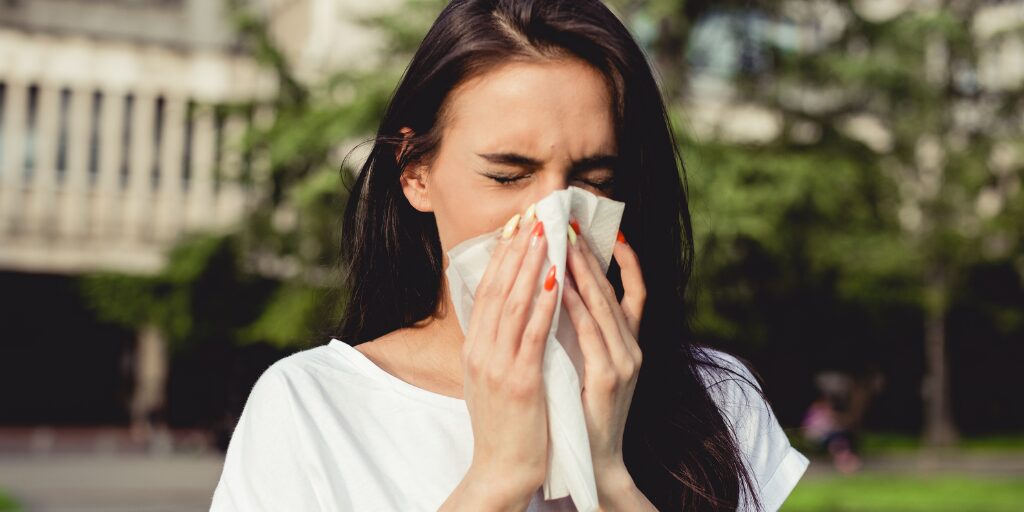If you’ve ever wondered, “Can allergies give me a sore throat?” you’re not alone. Many people experience this uncomfortable symptom when dealing with allergies. Allergies can trigger a range of reactions in your body, and a sore throat is often one of them.
Key Takeaways
- Allergies can cause a sore throat due to postnasal drip.
- Histamines released during allergic reactions increase mucus production.
- Common allergens include pollen, pet dander, and dust mites.
- Hydration and warm liquids can help soothe a sore throat caused by allergies.
- Consult a doctor for persistent symptoms or to explore treatment options.
Can Allergies Cause A Sore Throat?
Yes, allergies can definitely cause a sore throat. It’s a pretty common thing, actually. When your body decides that pollen or pet dander is the enemy, it goes into defense mode, and sometimes, that defense includes a scratchy, irritated throat. It’s not always a virus; sometimes, it’s just your immune system being a bit overzealous. Ever wonder, “can allergies Make your face puffy?” or “can allergies Trigger a cold?” Well, a sore throat is another way allergies can manifest. And it’s not fun.
Understanding Allergy Symptoms
So, what exactly happens when you have an allergy? Well, your body sees something harmless, like dust, as a threat. It then releases chemicals to fight it off. These chemicals cause all sorts of symptoms, from sneezing and a runny nose to, you guessed it, a sore throat. It’s all connected. You might also wonder, “can allergies Make your eyes blurry?” or even “can allergies Cause stomach issues?” The range of symptoms can be quite broad, depending on the person and the allergen.
The Role of Histamines
Histamines are the main culprits behind allergy symptoms. When your body detects an allergen, it releases histamines into your bloodstream. These histamines cause inflammation and swelling, which can lead to a sore throat. They also increase mucus production, which can drip down the back of your throat and make things even worse. It’s like a domino effect of discomfort.
Postnasal Drip Explained
Postnasal drip is a major reason why allergies cause sore throats. When you’re congested from allergies, that extra mucus has to go somewhere. Often, it drips down the back of your throat, causing irritation and inflammation. This constant dripping can make your throat feel scratchy, sore, and generally unpleasant. It’s like having a constant tickle in the back of your throat that you just can’t get rid of.
Common Symptoms Associated With Allergies
Identifying Allergy Symptoms
Okay, so you think you might have allergies? It’s more than just sneezing, you know. Allergies can show up in a bunch of different ways. You might notice a runny nose that just won’t quit, or maybe your eyes are super itchy and watery. Some people get skin rashes, which are never fun. And of course, there’s the classic sneezing fit. The key is to pay attention to when these symptoms pop up. Are they worse during certain times of the year, or after you’ve been around pets? That can give you a clue.
Sore Throat and Other Symptoms
So, can allergies actually give you a sore throat? Yep, they totally can. It’s usually not like the kind of sore throat you get with a cold or the flu, though. With allergies, it’s often more of an itchy, scratchy feeling. You might also have a stuffy nose, which leads to postnasal drip, which then irritates your throat. Plus, you might experience itchy ears or even the roof of your mouth might itch! Fun times, right? Unlike a cold, you probably won’t have a fever or body aches. If you’re dealing with stress hormone levels and allergy symptoms, it’s worth figuring out what’s going on.
Seasonal vs. Year-Round Allergies
One thing to consider is whether your allergies are seasonal or if they stick around all year. If it’s seasonal, like with [Pollen allergies], you’ll probably notice your symptoms flare up during specific times of the year, like spring or fall. Year-round allergies, on the other hand, are triggered by things like dust mites, pet dander, or mold. These can cause symptoms any time of the year. Knowing which type you have can help you figure out how to manage them. For example, if you know you’re allergic to pollen, you can take steps to limit your exposure during peak pollen season.
How Allergies Lead To A Sore Throat
Mechanism of Allergic Reactions
When you encounter an allergen, your body goes into defense mode. It identifies the allergen as a threat, even if it’s something harmless like pollen or pet dander. This triggers your immune system to release histamines, which are chemicals that cause a cascade of reactions. Think of it as your body’s alarm system going haywire. This whole process is what leads to those annoying allergy symptoms you know so well.
Impact of Mucus Production
One of the main things histamines do is ramp up mucus production. Your body starts producing more mucus to try and trap and flush out the allergen. While mucus is normally a good thing, too much of it can cause problems. All that extra mucus can lead to congestion and, more specifically, postnasal drip. This is when the mucus runs down the back of your throat, causing irritation and that scratchy, sore feeling. It’s like a constant tickle that just won’t go away. You might want to look into allergy testing if this is a recurring issue.
Common Allergens That Trigger Symptoms
Lots of things can set off your allergies and lead to a sore throat. Here are some of the usual suspects:
- Pollen: Tree, grass, and weed pollen are major culprits, especially during spring and fall.
- Pet Dander: Cats and dogs are common triggers, even if you don’t have direct contact with them.
- Dust Mites: These tiny creatures live in bedding, carpets, and upholstery, and their droppings can cause allergic reactions.
- Mold: Mold spores can be found both indoors and outdoors, and they thrive in damp environments.
- Certain Foods: While less common for sore throats specifically, food allergies can sometimes contribute to inflammation and discomfort. For example, some people find that dairy increases mucus production.
Knowing your triggers is the first step in managing your allergies and preventing that dreaded sore throat. If you can figure out what’s causing your symptoms, you can take steps to avoid those allergens and find some relief.
Preventing Sore Throat From Allergies
Avoiding Known Allergens
To keep that allergy-related sore throat at bay, your best bet is to dodge the things that set you off in the first place. Obvious, right? But it’s more than just knowing you’re allergic to cats. Think about it: are you really avoiding dust mites as much as you could? Minimizing exposure is key. This might mean more cleaning, better air filters, or even rethinking some of your home decor choices. It’s a pain, but it beats feeling like you’ve swallowed sandpaper.
Seasonal Precautions
Seasonal allergies are the worst because they’re so predictable, yet so hard to escape. When pollen counts are high, it’s like the world is conspiring against your sinuses. So, what can you do? Well, keeping windows closed is a start, even if it means sacrificing that fresh spring breeze. Ever wonder, “does rain help with pollen allergies?” Yes, rain washes pollen away, offering temporary relief. Here’s a few things to consider:
- Track pollen forecasts like you track the weather. Knowledge is power!
- Limit outdoor activities during peak pollen times. Early morning is often the worst.
- Change clothes and shower after being outside. Don’t drag that pollen party into your house.
Home Environment Adjustments
Your home should be your sanctuary, not an allergy incubator. Think about the air you’re breathing. Is it dry? Stuffy? Full of dust? A few tweaks can make a huge difference. Consider these:
- Invest in a good quality air purifier. It’s like a bodyguard for your lungs.
- Use allergen-proof bedding. Dust mites are sneaky little devils.
- Clean regularly, focusing on areas where allergens accumulate. We’re talking dusting, vacuuming, and washing curtains.
And hey, will wearing a mask help with allergies when you’re cleaning or doing yard work? Absolutely. It’s not just for pandemics anymore. Also, if you’re struggling with how to get rid of pollen allergies indoors, consider professional cleaning services to really deep-clean your carpets and upholstery.
Effective Remedies For Allergy-Related Sore Throat
So, you’ve got that scratchy, irritating sore throat from allergies? It’s the worst, I know. But don’t worry, there are things you can do to feel better. Let’s explore some effective remedies you can try at home.
Hydration and Warm Liquids
Staying hydrated is super important when dealing with a sore throat. Think of it like this: keeping your throat moist helps to soothe the irritation. I usually aim for at least eight glasses of water a day, but honestly, more is better. Besides water, warm liquids can be incredibly soothing. I’m talking about herbal teas (chamomile is my go-to), warm broth, or even just hot water with lemon and honey. The warmth helps to relax the throat muscles, and the honey can act as a natural cough suppressant. Just avoid anything too hot, as that can actually make the irritation worse.
Using Humidifiers
Dry air is your enemy when you have a sore throat. It can make the irritation even worse. That’s where humidifiers come in. They add moisture back into the air, which can help to soothe your throat and nasal passages. I like to run a humidifier in my bedroom at night, especially during the winter months when the air is naturally drier. Make sure to clean your humidifier regularly to prevent the growth of mold and bacteria. Nobody wants to trade a sore throat for a lung infection!
Over-the-Counter Solutions
Sometimes, home remedies just aren’t enough, and that’s okay! There are plenty of over-the-counter (OTC) solutions that can provide relief. Antihistamines can help to reduce allergy symptoms like sneezing and runny nose, which can indirectly help your sore throat. Decongestants can help to clear up nasal congestion, which can reduce postnasal drip (a common cause of allergy-related sore throats). And then there are throat lozenges and sprays, which can provide temporary relief from pain and irritation. Just be sure to read the labels carefully and follow the instructions. If you’re not sure what to take, ask your pharmacist for advice. They’re usually a great resource for allergy symptoms and OTC medications.
Distinguishing Between Allergies and Other Causes
Symptoms of Colds vs. Allergies
Okay, so you’ve got a sore throat, maybe a runny nose, and you’re feeling pretty crummy. Is it allergies, or is it something else, like a cold? That’s the million-dollar question, right? The key difference often lies in the presence of a fever and body aches, which are more common with colds and the flu, but not usually with allergies.
Here’s a quick rundown:
- Allergies: Itchy eyes, nose, and throat are big giveaways. You’ll also likely have clear, watery mucus. Allergies tend to last as long as you’re exposed to the allergen.
- Colds: Expect a fever, body aches, and thicker, discolored mucus. Colds usually clear up within a week or two.
- Flu: Similar to a cold, but symptoms are often more severe and come on suddenly. Fatigue and weakness can be intense.
When to Seek Medical Advice
Most of the time, you can manage allergy symptoms or a cold with over-the-counter stuff and some rest. But, there are times when you should definitely see a doctor. If you’re having trouble breathing, experiencing severe facial pain, or if your symptoms just aren’t getting better after a couple of weeks, it’s time to get checked out. Also, if you have a history of asthma or other respiratory issues, don’t hesitate to seek medical advice sooner rather than later.
Understanding Your Body’s Responses
Everyone’s body reacts a little differently. Some people get hit hard by allergies, while others barely notice them. The same goes for colds and other infections. Pay attention to what’s normal for you. Keep a symptom diary, noting when your symptoms started, what they are, and what seems to make them better or worse. This can be super helpful for your doctor in figuring out what’s going on and how to treat it. Also, allergy testing can pinpoint exactly what you’re allergic to, which is a game-changer for managing your symptoms long-term.
Long-Term Solutions For Allergy Management
Consulting with Allergists
Okay, so you’ve been dealing with allergy-related sore throats for a while now, and those over-the-counter meds just aren’t cutting it anymore? It might be time to bring in the big guns: an allergist. These are doctors who specialize in allergies, and they can really help you figure out what’s going on. They’re not just going to tell you to take some antihistamines and call it a day. They’ll dig deeper to find the root cause of your issues.
Allergy Testing and Treatments
So, you’re at the allergist’s office. What’s next? Probably allergy testing. This might sound scary, but it’s usually pretty straightforward. They might do a skin prick test, where they expose your skin to small amounts of different allergens and see if you react. Or, they might do a blood test to measure the levels of certain antibodies in your blood. Once they know what you’re allergic to, they can recommend treatments. One common treatment is immunotherapy, like allergy shots. This involves getting regular injections of small amounts of the allergen, which can help your body become less sensitive to it over time. It’s a commitment, but it can really make a difference.
Lifestyle Changes for Relief
Beyond seeing a doctor and getting treatments, there are things you can do in your daily life to manage your allergies. Think about it: are there specific times of the year when your symptoms are worse? Maybe you need to be extra careful during pollen season. Here are some ideas:
- Home Environment: Invest in a good air purifier with a HEPA filter to remove allergens from the air. Wash your bedding regularly in hot water to kill dust mites. Consider using allergen-proof mattress and pillow covers.
- Diet: Some people find that certain foods can worsen their allergy symptoms. Keeping a food diary can help you identify any potential triggers. For example, some people with pollen allergies also react to certain fruits and vegetables.
- Outdoor Activities: Check the pollen count before heading outside, and try to avoid being outdoors during peak pollen times. Wear a mask if you need to do yard work or other outdoor activities. And when you come back inside, take a shower and change your clothes to remove any allergens that might be clinging to you.
Wrapping It Up: Sore Throat and Allergies
So, can allergies really give you a sore throat? Absolutely. It’s not just your imagination. When allergens trigger your immune system, you might end up with that scratchy feeling in your throat. It’s annoying, but there are ways to manage it. Staying hydrated, using a humidifier, and trying some over-the-counter meds can help ease the discomfort. If your sore throat sticks around or gets worse, don’t hesitate to reach out to your doctor. They can help figure out what’s going on and suggest the best treatment. Remember, you’re not alone in this—lots of people deal with allergy-related symptoms. Take care of yourself, and hopefully, you’ll find some relief soon!
Frequently Asked Questions
Can allergies really cause a sore throat?
Yes, allergies can lead to a sore throat due to mucus buildup and postnasal drip.
What are common symptoms of allergies?
Common allergy symptoms include sneezing, itchy eyes, runny nose, and sore throat.
How do allergies cause mucus production?
When you have allergies, your body releases histamines, which increase mucus production.
What can I do to prevent a sore throat from allergies?
Avoid known allergens, keep windows closed during high pollen seasons, and maintain a clean home.
What are some remedies for allergy-related sore throat?
Stay hydrated, drink warm liquids, use a humidifier, and consider over-the-counter medications.
How can I tell if my sore throat is from allergies or a cold?
Allergy symptoms usually include itchy eyes and clear mucus, while colds often involve fever and thick mucus.




